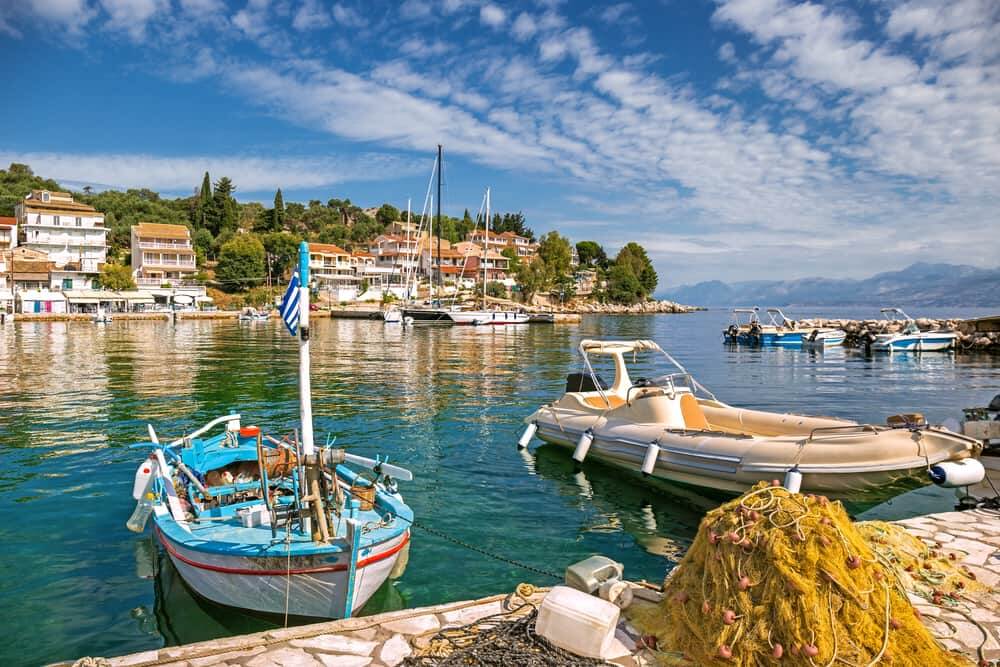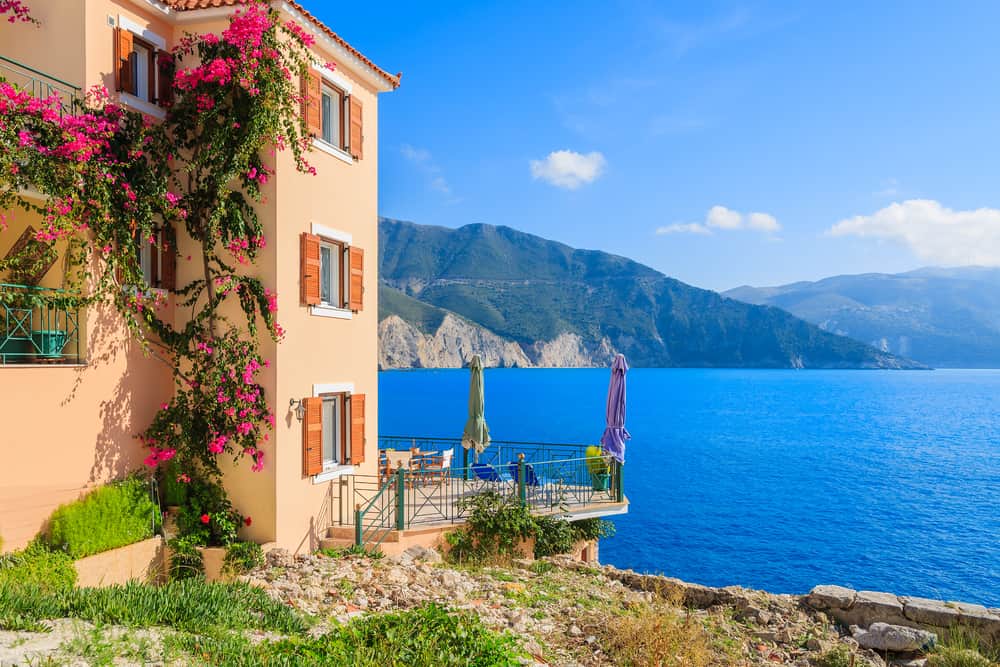Inheritance tax in Greece: What you need to know
Discover everything you need to know about inheritance tax in Greece. Our comprehensive guide covers the rates, who pays, how to calculate, and much more.

Want to own a piece of the Mediterranean? Greece, a sun-kissed country with a history as rich as its culture, is a top choice for UK tourists, travellers, and expats looking for a new home. From the bustling city life of Athens and Thessaloniki to the tranquil beauty of the Greek islands, finding your ideal property in Greece requires a clear plan.
If you’re ready to take the plunge on Hellenic property, this guide will walk you through everything you need to know to buy property in Greece as a foreigner. This includes steps to purchase a home, info on fees and costs, and the pitfalls to avoid.
And if you’re looking for ways to save money on currency exchange when buying property in Greece, check out the money services provider Wise. You can send large transfers with Wise for low fees* and mid-market exchange rates - making it ideal if you’re sending a secure international transfer.
Property prices in Greece have been steadily rising over the last few years, with average prices shooting up by 7-12% in urban areas of the country.¹
While this means you may have to spend a little more to buy a home there, it’s useful to know that Greek property remains much more affordable than some European countries. And with some major infrastructure projects underway in the country, value appreciation is expected.
It’s currently a seller’s market in Greece, so you may have to compete with other buyers and act fast to secure your dream home.
Yes, foreign citizens can buy property in Greece - but it’s easier for some than others.
While EU residents will run into almost no restrictions on purchasing property in Greece, non-EU residents (including UK nationals) may find the process a little more complicated.
For example, you’ll need to register for tax and open a Greek bank account, and you may also face restrictions on how much you can lend from a Greek bank or mortgage provider.
Once the UK officially left the EU, buying property in Greece became a little more difficult for UK citizens.
You will still have the right to buy and own property, and rent it out if you want to. But you may also face restrictions and a few more administrative processes, as mentioned above.
But the good news is that as a non-EU citizen, British buyers are now eligible for the Golden Visa scheme, which we’ll look at next.
Yes, you can buy a property in Greece and get residency, as long as you meet certain conditions. This is one of the main attractions of buying property in Greece - its Golden Visa scheme.
This grants a five-year residency permit to foreigners investing in property in the country. You’ll need to spend at least €400,000 EUR (this rises to €800,000 for popular parts of Greece such as Thessaloniki, Mykonos and Santorini)² and meet other criteria such as having health insurance and no criminal record.
Once granted, the holder of a Golden Visa and their immediate family members can legally live and work in Greece for 5 years.² However, you aren’t actually required to live there and you can choose to rent out your purchased property if you like - but only on a long-term basis, as short-term rentals (such as on Airbnb and other platforms) are not permitted.
If you do settle in Greece, you can apply for citizenship once you’ve lived there for 7 years.² Or, you can simply renew your residency permit.
The cost of property in Greece is largely dependent on the type of property and where you’re looking to buy.
Let’s take a look at average prices for apartments and homes in a few of the most popular parts of the country:³
| Area | Cost of a home (€/sqm) Q2 2025 |
|---|---|
| Athens Centre | 2,400 |
| Athens North | 3,296 |
| Athens South | 4,052 |
| Athens West | 2,135 |
| Thessaloniki | 2,625 |
| Chalkidiki | 2,600 |
| Heraklion | 1,778 |
| Corfu | 2,240 |
| Zante | 2,292 |
And, if you’re arranging your property purchase in Greece while still in the UK, you’ll need a safe, reliable and preferably low-cost way to send over fees, deposits and other payments.
The Wise account could be a convenient solution, with transparent, low fees*, and multiple layers of security, so you can safely transfer large amounts overseas.
If it’s nearly time to start your property search, here’s how to get started.
Because of the nature of finding homes across islands, most property-seekers choose to use a real estate agent in their search. You can go for a Greek agent, or choose one in your home country - although they’ll usually work in cooperation with an agent in Greece.
An estate agent should be able to help you with everything from getting legal advice to taking out insurance, along with finding decorators, contractors and other “next-steps” after the sale. It may also be possible to find an agent who will deal with construction services on your behalf, including supervising the work.
All in all, if you’re looking for support as you make your purchase and get ready to move, contracting an agent is a good idea.
If you’re hoping to skip the real estate agent fees, your first stop will probably be online listings. Some good places to find houses and flats for sale in Greece are:

In Greece, you’ll be spoilt for choice when it comes to location. There’s something for everyone, from vibrant cities and countryside boltholes to sleepy fishing villages and picturesque seaside resorts.
Here are just a few of the best places to start your property search:
- Corfu: A mega popular destination for UK expats, the island of Corfu has a UNESCO heritage old town, beautiful sandy bays and lively tourist areas.
- Kefalonia: A little quieter than Corfu, this pretty island boasts charming fishing villages, fantastic walking trails and sparkling turquoise waters. It’s a great destination for retirees, or anyone in search of the quiet life.
- Zakynthos/Zante: One of the Ionian islands, Zakynthos has it all - stunning beaches, historic castles, hilltop villages, family-friendly resorts and party hotspots. It’s all about finding the right place for you.
- Crete: Chania on the island of Crete is a popular spot for UK buyers, thanks to its reputation for safety, a sun-soaked climate and a choice of bustling cities, coastal communities and pretty mountain villages.
- Rhodes: This holiday hotspot has a wonderfully preserved medieval old town, along with lively seaside villages and great connections to the UK and Europe. Rhodes is also a good place to buy property, particularly a holiday home - although it can be more expensive than other islands.
- Peloponnese: This large central region is bursting with history, and is a great spot for food lovers too thanks to exceptional local produce - including the famous Kalamata olives.
- Athens: With year-round entertainment and facilities, the historic capital of Greece is ideal for those who love bustling city life. It’s well-connected too, with frequent direct flights to the UK. But it doesn’t come cheap, and you may find that an apartment is the most readily available and affordable option.
Buying a home in another country - especially when you live in another country - will always come with its risks and challenges. Let’s take a look at some of the potential pitfalls of buying property in Greece.
As is the case anywhere, you may run into real estate scammers in your Greek property search. While the exact scams change every day, there are a few things to keep in mind to help ensure you’re not taken for a ride:
Greece’s turbulent economic history - even stretching back to the financial crash in 2009 - has understandably made some people nervous about investing in property in the country.
But the good news is that in 2025, the Greek economy is doing well, and is expected to maintain its robust GDP growth in the years to come.⁴
So provided you follow the advice above to avoid scams, and seek expert advice to buy your home - it should be as safe to buy property in Greece as it is anywhere else.
Sensible buyers will do their homework, avoid overstretching themselves financially, and take steps to keep their money safe.

Villas are among the most sought-after types of property in Greece. However, it’s a good idea to remember there are other options that may serve you better or cost less in the long run.
Apartments, for instance, may come with sweeping ocean views and beach access, while being significantly cheaper to buy and maintain.
That being said, there’s no type of property you can’t find in Greece. Modern homes, historic villas, townhouses, flats, and plots of land are all available, depending on where you look.
Realistically, buying a home in Greece should be approached with some caution. Because many properties are historic, they may require modernisation or rigorous upkeep - essential work which may not necessarily have been done (or done to the correct standard) by previous owners.
Because of this, it’s a smart idea to bring your own inspector and walk through the house with them, so you can get a real idea of any problems or necessary maintenance. It’s possible to find well-kept, up-to-date homes in Greece, but it’s still a good idea to do your research.
Buying property in Greece is a pretty straightforward process, even for a foreigner. These are the steps to keep in mind as you get started:
- Choose where to buy. While shopping online can give you a good idea of the property itself, it can be difficult to get a real feel for the area without being there. As such, it’s a good idea to take a trip to Greece to scout where you’d like to buy beforehand, if possible.
- Get your Greek tax number (AFM). You’ll need this to buy and sell property in Greece. You can apply for your AFM at the local tax office with your passport and a completed application form. You’ll also need to open a Greek bank account.
- Find a real estate agent. Make sure the agent is registered with the Hellenic Association of Realtors (HAR). If you’d rather search yourself, begin looking online.
- Visit the property for a viewing. It can also be a good idea to take a builder or other professional with you to check for any structural or other issues.
- Get your paperwork in order. You’re likely to need proof of ID and residence/visa (if applicable), along with copies of tax returns, bank statements and other documentation.
- Pick your property and make an offer. After choosing a property and doing your due diligence, make an offer to the seller.
- Get a lawyer. Your lawyer will do the required legal searches and manage all the necessary paperwork for the purchase, including checking whether there are any restrictions or prohibitions on the property.
- Get a technical survey of the property carried out. This isn’t mandatory, but it could help to flag up any serious issues early on.
- Sign the preliminary contract and pay the deposit.
- Finalise your mortgage arrangements
- Get a notary and sign the deed of sale. The notary is an essential part of property transactions in Greece, handling the completion of the final contract. So, make sure all your documents are in order so you can breeze through this process.
- Pay the final balance and pay your taxes. The buyer pays for the property tax transfer in Greece - we’ll look at how much you can expect to pay later in this guide.
- Get the keys and enjoy your new property!
A number of Greek banks offer mortgages to foreign applicants. The National Bank of Greece, Eurobank and Alpha Bank are a few to try.
If you’re non-resident in Greece, you might find that you can only borrow up to 70% of the property’s value - which means a higher deposit. You may also be limited to mortgages with higher interest rates, unlike for Greek residents.⁵
To apply for a mortgage, you’ll typically need the following:⁵
When signing the preliminary agreement to buy a property, you’ll be required to pay 10% of the property’s total value as a deposit.⁵
A cost-effective way to do this is with your Wise account, with which you can send money between the UK and Greece for low fees* and mid-market exchange rates.
As you’re setting your total budget, it’s a good idea to factor in the fees and taxes as well as considering property prices.
While it’s important to do your own research, these fees are some standard ones to look out for:⁵
| Type | Fee |
|---|---|
| Notary fees | 0.5% to 1% |
| Legal fees | Around 1% |
| Land Registry fees | 0.5% to 1% |
| VAT (new properties) | 24% |
| Stamp Duty (new properties) | 3% |
| Transfer tax (resale properties) | 3% to 24% (depending on property value) |
And that’s it - our comprehensive guide to buying property in Greece for UK buyers.
We’ve covered all the important stuff, from property prices, fees and taxes through to mortgages, how to start your search and how the buying process works.
And, if you want to save money while buying your new property in Greece, make sure to use the Wise account to send your international transfer. It’s not a bank account and offers customers an alternative option to a conventional bank account, but has similar features.
Here are the main benefits for using Wise: |
|---|
|
Sources used for this article:
Sources checked on 08-Sep-2025.
*Please see terms of use and product availability for your region or visit Wise fees and pricing for the most up to date pricing and fee information.
This publication is provided for general information purposes and does not constitute legal, tax or other professional advice from Wise Payments Limited or its subsidiaries and its affiliates, and it is not intended as a substitute for obtaining advice from a financial advisor or any other professional.
We make no representations, warranties or guarantees, whether expressed or implied, that the content in the publication is accurate, complete or up to date.

Discover everything you need to know about inheritance tax in Greece. Our comprehensive guide covers the rates, who pays, how to calculate, and much more.

The complete guide to buying property in Corfu as a foreigner. Get step-by-step advice and learn about local laws, prices, fees and more.

Everything you need to know about moving to Greece from the UK. Read about visas, popular expat destinations, healthcare and more.

Everything you need to know about selling your property in Greece, including the process, fees, property taxes and timescales.

Are you thinking about relocating to Greece? With it’s beautiful beaches, vibrant culture and incredible history, this country is hot spot for expats. But in...

If you’re planning a move or even a long visit to Greece, you’re probably picturing zipping around the islands in one of the European country’s famous tiny...